Bloom Clock/Keys/New Hampshire/July/White Flowers

This page is part of a dichotomous key for plants recorded as blooming in New Hampshire during the month of July.
These plants have the following traits:
- White flowers
----
Achillea millefolium
 Wikipedia • Commons • Wikibooks (horticulture) • Wikibooks (subject) • Wikispecies • Fruit and seed clock |
Profile for Achillea millefolium (Common Yarrow)
Recent Logs[edit | edit source]
TristanDolciano *˜˜˜12:00, 22 July 2019 (UTC) | ||||||||||
Global data:
Temperate zone season(s): Late Spring, Early Summer, Mid Summer, Late Summer, Early Fall, Mid Fall, Late Fall
Aralia hispida
 Wikipedia • Commons • Wikibooks (horticulture) • Wikibooks (subject) • Wikispecies • Fruit and seed clock |
Profile for Aralia hispida (Bristly Spikenard, Bristly Sarsaparilla)
Recent Logs[edit | edit source]
| ||||||||
Global data:
Temperate zone season(s): Early Summer, Mid Summer, Late Summer, Early Fall
Aster novae-angliae
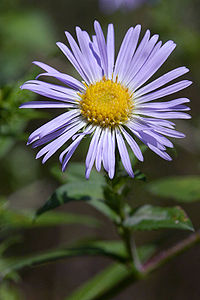 Wikipedia • Commons • Wikibooks (horticulture) • Wikibooks (subject) • Wikispecies • Fruit and seed clock |
Profile for Aster novae-angliae (New England Aster)
Recent Logs[edit | edit source]
| ||||||||||
Global data:
Temperate zone season(s): Early Summer, Mid Summer, Late Summer, Early Fall, Mid Fall, Late Fall
Calystegia sepium
 Wikipedia • Commons • Wikibooks (horticulture) • Wikibooks (subject) • Wikispecies • Fruit and seed clock |
Profile for Calystegia sepium (Hedge Bindweed)
Recent Logs[edit | edit source]
| ||||||||||
Global data:
Temperate zone season(s): Mid Summer, Late Summer, Early Fall
Chimaphila umbellata
 Wikipedia • Commons • Wikibooks (horticulture) • Wikibooks (subject) • Wikispecies • Fruit and seed clock |
Profile for Chimaphila umbellata (Pipsissewa)
Recent Logs[edit | edit source]
| ||||||||||
Global data:
Temperate zone season(s): Mid Summer
Cicuta maculata
 Wikipedia • Commons • Wikibooks (horticulture) • Wikibooks (subject) • Wikispecies • Fruit and seed clock |
Profile for Cicuta maculata (Spotted Water Hemlock)
Recent Logs[edit | edit source]
| ||||||||||||||||||||
Global data:
Temperate zone season(s): Mid Summer, Late Summer
Dalibarda repens
 Wikipedia • Commons • Wikibooks (horticulture) • Wikibooks (subject) • Wikispecies • Fruit and seed clock |
Profile for Dalibarda repens (Dewdrop, Robin Runaway)
Recent Logs[edit | edit source]
| ||||||||||||
Global data:
Temperate zone season(s): Early Summer, Mid Summer, Late Summer
Daucus carota
 Wikipedia • Commons • Wikibooks (horticulture) • Wikibooks (subject) • Wikispecies • Fruit and seed clock |
Profile for Daucus carota (Carrot, Queen Anne's Lace)
Recent Logs[edit | edit source]
| ||||||||||
Global data:
Temperate zone season(s): Early Summer, Mid Summer, Late Summer, Early Fall, Mid Fall
Erigeron annuus
 Wikipedia • Commons • Wikibooks (horticulture) • Wikibooks (subject) • Wikispecies • Fruit and seed clock |
Profile for Erigeron annuus (Fleabane)
Recent Logs[edit | edit source]
| ||||||||
Global data:
Temperate zone season(s): Late Spring, Early Summer, Mid Summer, Late Summer
Eriocaulon aquaticum
 Wikipedia • Commons • Wikibooks (horticulture) • Wikibooks (subject) • Wikispecies • Fruit and seed clock |
Profile for Eriocaulon aquaticum (Pipewort)
Recent Logs[edit | edit source]
| ||||||||||||||
Global data:
Temperate zone season(s): Mid Summer, Late Summer
Eupatorium perfoliatum
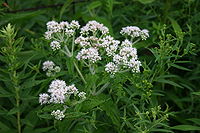 Wikipedia • Commons • Wikibooks (horticulture) • Wikibooks (subject) • Wikispecies • Fruit and seed clock |
Profile for Eupatorium perfoliatum (Boneset)
Recent Logs[edit | edit source]
| ||||||||
Global data:
Fragaria vesca
 Wikipedia • Commons • Wikibooks (horticulture) • Wikibooks (subject) • Wikispecies • Fruit and seed clock |
Profile for Fragaria vesca (Woodland Strawberry)
Recent Logs[edit | edit source]
| ||
Global data:
Temperate zone season(s): Mid Spring, Late Spring, Late Summer, Early Fall
Frangula alnus
 Wikipedia • Commons • Wikibooks (horticulture) • Wikibooks (subject) • Wikispecies • Fruit and seed clock |
Profile for Frangula alnus (Glossy Buckthorn)
Recent Logs[edit | edit source] | ||||||||||||
Global data:
Temperate zone season(s): Early Summer, Mid Summer
Galium triflorum
 Wikipedia • Commons • Wikibooks (horticulture) • Wikibooks (subject) • Wikispecies • Fruit and seed clock |
Profile for Galium triflorum (Fragrant Bedstraw)
Recent Logs[edit | edit source]
| ||||||||||||
Global data:
Temperate zone season(s): Early Summer, Mid Summer, Late Summer, Early Fall, Mid Fall, Late Fall
Gaultheria procumbens
 Wikipedia • Commons • Wikibooks (horticulture) • Wikibooks (subject) • Wikispecies • Fruit and seed clock |
Profile for Gaultheria procumbens (Eastern Teaberry, Checkerberry, Boxberry and American Wintergreen)
Recent Logs[edit | edit source]
| ||||||||||||||||||
Global data:
Temperate zone season(s): Mid Summer, Late Summer
Hemerocallis
 Wikipedia • Commons • Wikibooks (horticulture) • Wikibooks (subject) • Wikispecies • Fruit and seed clock |
Profile for Hemerocallis (Daylily)
Recent Logs[edit | edit source]
| ||||||||||
Global data:
Temperate zone season(s): Early Summer, Mid Summer, Late Summer, Early Fall
Hosta
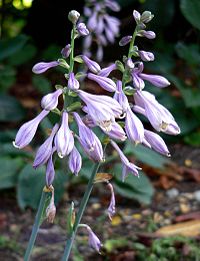 Wikipedia • Commons • Wikibooks (horticulture) • Wikibooks (subject) • Wikispecies • Fruit and seed clock |
Profile for Hosta (Hosta)
Recent Logs[edit | edit source]
| ||||||||||
Global data:
Temperate zone season(s): Early Summer, Late Summer, Late Summer, Early Fall
Lepidium virginicum
 Wikipedia • Commons • Wikibooks (horticulture) • Wikibooks (subject) • Wikispecies • Fruit and seed clock |
Profile for Lepidium virginicum (Virginia pepperweed)
Recent Logs[edit | edit source] | ||||||||||||||||
Global data:
Temperate zone season(s): Early Summer, Mid Summer, Late Summer, Early Fall, Mid Fall, Late Fall
Leucanthemum vulgare
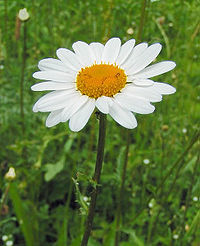 Wikipedia • Commons • Wikibooks (horticulture) • Wikibooks (subject) • Wikispecies • Fruit and seed clock |
Profile for Leucanthemum vulgare (Oxeye Daisy)
Recent Logs[edit | edit source]
| ||||||||
Global data:
Temperate zone season(s): Late Spring, Early Summer, Mid Summer
Lythrum salicaria
 Wikipedia • Commons • Wikibooks (horticulture) • Wikibooks (subject) • Wikispecies • Fruit and seed clock |
Profile for Lythrum salicaria (Purple Loosestrife)
Recent Logs[edit | edit source] | ||||||||
Global data:
Temperate zone season(s): Early Summer, Mid Summer, Late Summer, Early Fall
Melampyrum lineare
 Wikipedia • Commons • Wikibooks (horticulture) • Wikibooks (subject) • Wikispecies • Fruit and seed clock |
Profile for Melampyrum lineare (Cow-wheat)
Recent Logs[edit | edit source]
| ||||||||||||
Global data:
Temperate zone season(s): Early Summer, Mid Summer, Late Summer
Melilotus alba
 Wikipedia • Commons • Wikibooks (horticulture) • Wikibooks (subject) • Wikispecies • Fruit and seed clock |
Profile for Melilotus alba (White Sweet Clover)
Recent Logs[edit | edit source]
| ||||||||||||
Global data:
Temperate zone season(s): Early Summer, Mid Summer, Late Summer, Early Fall, Mid Fall
Mitchella repens
 Wikipedia • Commons • Wikibooks (horticulture) • Wikibooks (subject) • Wikispecies • Fruit and seed clock |
Profile for Mitchella repens (Partridge Berry)
Recent Logs[edit | edit source]
| ||||||||||||||
Global data:
Temperate zone season(s): Early Summer, Mid Summer
Mollugo verticillata
 Wikipedia • Commons • Wikibooks (horticulture) • Wikibooks (subject) • Wikispecies • Fruit and seed clock |
Profile for Mollugo verticillata (Carpetweed)
Recent Logs[edit | edit source]
| ||||||||||||
Global data:
Temperate zone season(s): Early Summer, Mid Summer, Late Summer, Early Fall, Mid Fall
Monotropa uniflora
 Wikipedia • Commons • Wikibooks (horticulture) • Wikibooks (subject) • Wikispecies • Fruit and seed clock |
Profile for Monotropa uniflora (Indian Pipe)
Recent Logs[edit | edit source]
| ||||||||||||||||||
Global data:
Temperate zone season(s): Early Summer, Mid Summer, Late Summer, Early Fall
Nymphaea odorata
 Wikipedia • Commons • Wikibooks (horticulture) • Wikibooks (subject) • Wikispecies • Fruit and seed clock |
Profile for Nymphaea odorata (White Water Lily)
Recent Logs[edit | edit source]
| ||||||||||||||||
Global data:
Temperate zone season(s): Early Summer, Mid Summer, Late Summer
Nymphoides cordata
 Wikipedia • Commons • Wikibooks (horticulture) • Wikibooks (subject) • Wikispecies • Fruit and seed clock |
Profile for Nymphoides cordata (Floating Heart)
Recent Logs[edit | edit source]
| ||||||||||||||
Global data:
Temperate zone season(s): Mid Summer, Late Summer
Plantago lanceolata
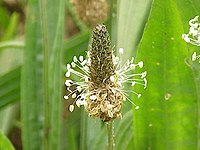 Wikipedia • Commons • Wikibooks (horticulture) • Wikibooks (subject) • Wikispecies • Fruit and seed clock |
Profile for Plantago lanceolata (Ribwort Plantain)
Recent Logs[edit | edit source]--Anna reg 20:54, 29 April 2010 (UTC)
| ||||||||||||
Global data:
Temperate zone season(s): Late Spring, Early Summer, Mid Summer, Late Summer, Early Fall, Mid Fall
Plantago major
 Wikipedia • Commons • Wikibooks (horticulture) • Wikibooks (subject) • Wikispecies • Fruit and seed clock |
Profile for Plantago major (Broadleaf Plantain)
Recent Logs[edit | edit source]
| ||||||||||
Global data:
Temperate zone season(s): Early Summer, Mid Summer, Late Summer
Potentilla arguta
 Wikipedia • Commons • Wikibooks (horticulture) • Wikibooks (subject) • Wikispecies • Fruit and seed clock |
Profile for Potentilla arguta (Tall Cinquefoil)
Recent Logs[edit | edit source]
| ||||||||||||
Global data:
Temperate zone season(s): Early Summer, Mid Summer, Late Summer, Early Fall
Phytolacca americana
 Wikipedia • Commons • Wikibooks (horticulture) • Wikibooks (subject) • Wikispecies • Fruit and seed clock |
Profile for Phytolacca americana (Pokeweed)
Recent Logs[edit | edit source]
| ||||||
Global data:
Temperate zone season(s): Early Summer, Mid Summer, Late Summer, Early Fall, Mid Fall
Pyrola
 Wikipedia • Commons • Wikibooks (horticulture) • Wikibooks (subject) • Wikispecies • Fruit and seed clock |
Profile for Pyrola (Pyrola)
Recent Logs[edit | edit source]
| ||||||||||
Global data:
Rhus typhina
 Wikipedia • Commons • Wikibooks (horticulture) • Wikibooks (subject) • Wikispecies • Fruit and seed clock |
Profile for Rhus typhina (Staghorn Sumac)
Recent Logs[edit | edit source]
| ||||||||||||
Global data:
Temperate zone season(s): Early Summer
Robinia pseudoacacia
 Wikipedia • Commons • Wikibooks (horticulture) • Wikibooks (subject) • Wikispecies • Fruit and seed clock |
Profile for Robinia pseudoacacia (Black Locust)
Recent Logs[edit | edit source]
| ||
Global data:
Temperate zone season(s): Late Spring
Rosa
 Wikipedia • Commons • Wikibooks (horticulture) • Wikibooks (subject) • Wikispecies • Fruit and seed clock |
Profile for Rosa (Rose)
Recent Logs[edit | edit source]
| ||||||||||||||
Global data:
Temperate zone season(s): Late Spring, Early Summer, Mid Summer, Late Summer, Early Fall Mid Fall, Late Fall
Rubus pensilvanicus
 Wikipedia • Commons • Wikibooks (horticulture) • Wikibooks (subject) • Wikispecies • Fruit and seed clock |
Profile for Rubus pensilvanicus (Blackberry)
Recent Logs[edit | edit source]
| ||
Global data:
Temperate zone season(s): Late Spring, Early Summer
Sagittaria graminea
 Wikipedia • Commons • Wikibooks (horticulture) • Wikibooks (subject) • Wikispecies • Fruit and seed clock |
Profile for Sagittaria graminea (Grassy Arrowhead)
Recent Logs[edit | edit source]
| ||||||||||||||
Global data:
Sambucus canadensis
 Wikipedia • Commons • Wikibooks (horticulture) • Wikibooks (subject) • Wikispecies • Fruit and seed clock |
Profile for Sambucus canadensis (American Elderberry)
Recent Logs[edit | edit source]
| ||
Global data:
Temperate zone season(s): Early Summer, Mid Summer
Saponaria officinalis
 Wikipedia • Commons • Wikibooks (horticulture) • Wikibooks (subject) • Wikispecies • Fruit and seed clock |
Profile for Saponaria officinalis (Soapwort)
Recent Logs[edit | edit source]
| ||||||||
Global data:
Temperate zone season(s): Late Spring, Early Summer, Mid Summer, Late Summer, Early Fall, Mid Fall
Silene latifolia
 Wikipedia • Commons • Wikibooks (horticulture) • Wikibooks (subject) • Wikispecies • Fruit and seed clock |
Profile for Silene latifolia (White Campion)
Recent Logs[edit | edit source]
| ||
Global data:
Temperate zone season(s): Late Spring, Early Summer, Mid Summer
Silene vulgaris
 Wikipedia • Commons • Wikibooks (horticulture) • Wikibooks (subject) • Wikispecies • Fruit and seed clock |
Profile for Silene vulgaris (Bladder Campion)
Recent Logs[edit | edit source]
| ||
Global data:
Tilia americana
 Wikipedia • Commons • Wikibooks (horticulture) • Wikibooks (subject) • Wikispecies • Fruit and seed clock |
Profile for Tilia americana (Basswood)
Recent Logs[edit | edit source]
| ||
Global data:
Temperate zone season(s): Early Summer, Mid Summer
Tradescantia
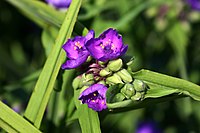 Wikipedia • Commons • Wikibooks (horticulture) • Wikibooks (subject) • Wikispecies • Fruit and seed clock |
Profile for Tradescantia (Spiderwort)
2009 Logs[edit | edit source]=====Recent Logs===== | ||||||||||
Global data:
Temperate zone season(s): Late Spring, Early Summer, Mid Summer, Late Summer
Trifolium repens
 Wikipedia • Commons • Wikibooks (horticulture) • Wikibooks (subject) • Wikispecies • Fruit and seed clock |
Profile for Trifolium repens (White Clover)
Recent Logs[edit | edit source]
| ||||||||||
Global data:
Temperate zone season(s): Late Spring, Early Summer, Mid Summer, Late Summer, Early Fall, Mid Fall
Viola tricolor
 Wikipedia • Commons • Wikibooks (horticulture) • Wikibooks (subject) • Wikispecies • Fruit and seed clock |
Profile for Viola tricolor (Heartsease, Johnny-jump-up)
Recent Logs[edit | edit source]
| ||
Global data:
Temperate zone season(s): Early Summer, Mid Summer, Late Summer, Early Fall, Mid Fall
Veronica officinalis
 Wikipedia • Commons • Wikibooks (horticulture) • Wikibooks (subject) • Wikispecies • Fruit and seed clock |
Profile for Veronica officinalis (Heath Speedwell)
Recent Logs[edit | edit source] | ||||||||||||
Global data:

